Idea for Mind Works began with lab rats

Dear Readers, I am often asked when and how I happened to get the idea for the Mind Works program all those years ago, when mental exercise was essentially unheard of.
In 1986 I read the description of an experiment in which half of the rats in a laboratory experiment were given activities to do, such as ladders to climb, tunnels to go through, and the opportunities to be with other rats, while the remaining half of the rats were kept as usual in their cages.
Fascinatingly, when the rats were examined later, it was discovered that the rats that had been “entertained” lived longer than their bored counter parts, and also that unlike the control group, their brains had grown and changed.
The experimenters decided that they wanted to discover if the same outcomes would occur in really elderly rats, rats that would be over 100 if rated in human years. So they conducted the same experiment with a group of these really old rats and the same results occurred. The rats given fun things to do once again lived longer, and their brains had also grown and changed.
The thought came to me: If this kind of an experiment brings such results as these to laboratory rats, maybe it would work similarly with people. So I then began to put various ideas together, trying to decide on certain mental activities that would be challenging, solvable, and yet fun. There were no mental fitness classes that I could discover, and asking at senior centers for such classes usually brought a reaction such as: “Mental fitness? What do you mean by that?”
Therefore, one of my first moves was to check out local bookstores for possible games and puzzles books. I looked them over and bought a few as a start. They gave me enough ideas to put together a class, I received permission to start at a local senior center, and so it all began. Needless to say, I kept an eye out for more types of books, and by now, twenty years later, I have quite a library.
As time passed, the idea of mental fitness became quite popular and I found a company dedicated to thinking, called Critical Thinking Software and Press. I have since bought numerous items from them that have become indispensable in the Mind Works classes. There are literally hundreds of activities that provide challenges, from the very simple to the most difficult and abstract.
The Mind Works program provides its “students” with as wide a variety as possible to activities. Every week has several different problems to solve. Some of them may involve numbers or words or special blocks to arrange in specific patterns. Not every person likes every activity, but they all give each puzzle their best effort and the results are always promising, usually accurate and everyone has FUN while they are performing. Communicating also plays a large part in class activities, and two adjacent individuals often work together in their efforts.
Who knows how long I can continue the Mind Works program? I have certainly enjoyed it as much as anyone else, and I must mention one special lady who has enjoyed it so much that she has been a regular attendee for more than fifteen years! Others have been coming for more than five, and I still have the occasional beginner. What more could I ask?

